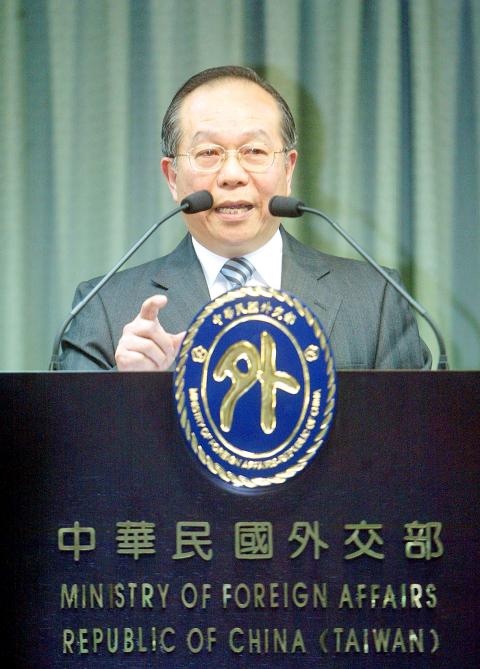Ambassador to Eswatini Thomas Chen (陳經銓) has been hospitalized in South Africa after he was found seriously ill in his office on June 22, the Ministry of Foreign Affairs said yesterday.
Chen was first treated in Eswatini after he fell ill, ministry spokesperson Andrew Lee (李憲章) said, but he has since been transferred to a hospital in South Africa after the ministry received permission from Chen’s family.
Lee did not disclose the nature of Chen’s illness, saying only that he fell ill because he had been very busy over the past few months arranging President Tsai Ing-wen’s (蔡英文) state visit to Eswatini in April and a visit by King Mswati III to Taiwan earlier this month.

Photo: CNA
The head of the nation’s medical mission in Eswatini and a nurse are accompanying Chen at the South African hospital, Lee said.
Swazi King Mswati III, Tsai and Minister of Foreign Affairs Joseph Wu (吳釗燮) have all expressed concern over Chen’s hospitalization and have wished him a swift recovery, Lee added.
Chen has served as ambassador to the southern African nation, previously known as Swaziland, since September 2013.
He has previously served as deputy representative to Canada and head of the ministry’s Bureau of Consular Affairs.
The nation’s embassy in Eswatini is currently being headed by Chen’s deputy, Lee said.
Eswatini is the nation’s only remaining diplomatic ally in Africa after Burkina Faso switched recognition to China on May 24.

Alain Robert, known as the "French Spider-Man," praised Alex Honnold as exceptionally well-prepared after the US climber completed a free solo ascent of Taipei 101 yesterday. Robert said Honnold's ascent of the 508m-tall skyscraper in just more than one-and-a-half hours without using safety ropes or equipment was a remarkable achievement. "This is my life," he said in an interview conducted in French, adding that he liked the feeling of being "on the edge of danger." The 63-year-old Frenchman climbed Taipei 101 using ropes in December 2004, taking about four hours to reach the top. On a one-to-10 scale of difficulty, Robert said Taipei 101

A preclearance service to facilitate entry for people traveling to select airports in Japan would be available from Thursday next week to Feb. 25 at Taiwan Taoyuan International Airport, Taoyuan International Airport Corp (TIAC) said on Tuesday. The service was first made available to Taiwanese travelers throughout the winter vacation of 2024 and during the Lunar New Year holiday. In addition to flights to the Japanese cities of Hakodate, Asahikawa, Akita, Sendai, Niigata, Okayama, Takamatsu, Kumamoto and Kagoshima, the service would be available to travelers to Kobe and Oita. The service can be accessed by passengers of 15 flight routes operated by

Taiwanese and US defense groups are collaborating to introduce deployable, semi-autonomous manufacturing systems for drones and components in a boost to the nation’s supply chain resilience. Taiwan’s G-Tech Optroelectronics Corp subsidiary GTOC and the US’ Aerkomm Inc on Friday announced an agreement with fellow US-based Firestorm Lab to adopt the latter’s xCell, a technology featuring 3D printers fitted in 6.1m container units. The systems enable aerial platforms and parts to be produced in high volumes from dispersed nodes capable of rapid redeployment, to minimize the risk of enemy strikes and to meet field requirements, they said. Firestorm chief technology officer Ian Muceus said

MORE FALL: An investigation into one of Xi’s key cronies, part of a broader ‘anti-corruption’ drive, indicates that he might have a deep distrust in the military, an expert said China’s latest military purge underscores systemic risks in its shift from collective leadership to sole rule under Chinese President Xi Jinping (習近平), and could disrupt its chain of command and military capabilities, a national security official said yesterday. If decisionmaking within the Chinese Communist Party has become “irrational” under one-man rule, the Taiwan Strait and the regional situation must be approached with extreme caution, given unforeseen risks, they added. The anonymous official made the remarks as China’s Central Military Commission Vice Chairman Zhang Youxia (張又俠) and Joint Staff Department Chief of Staff Liu Zhenli (劉振立) were reportedly being investigated for suspected “serious